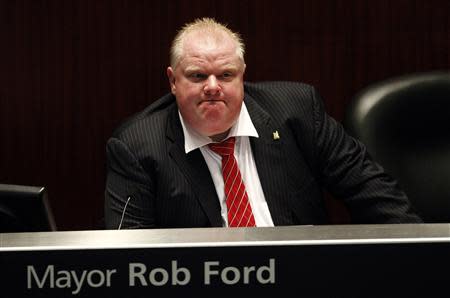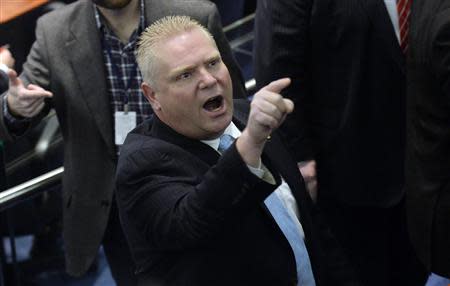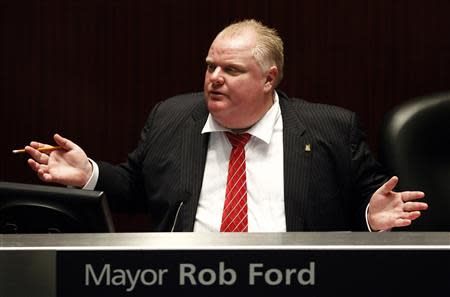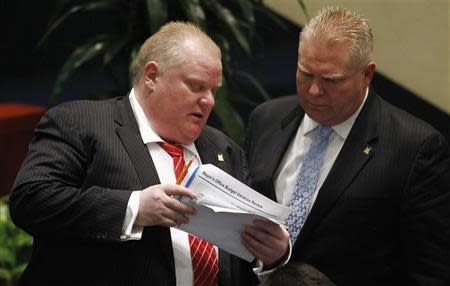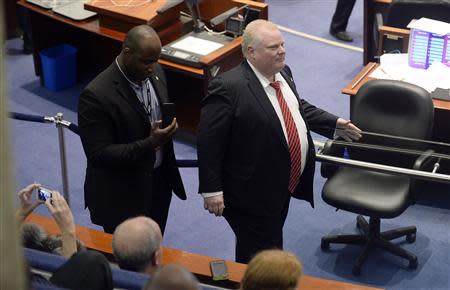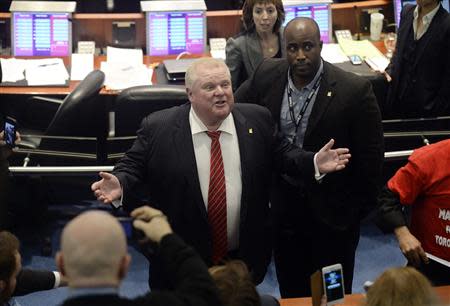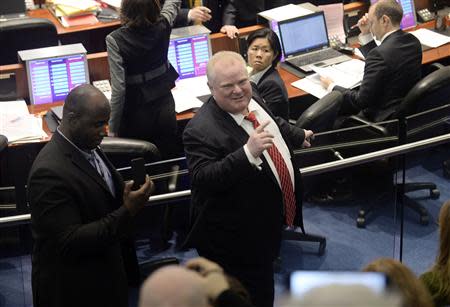Drug-taking Toronto mayor poses dilemma for Canadian government
By David Ljunggren and Randall Palmer OTTAWA (Reuters) - Toronto's crack-smoking Mayor Rob Ford is a headache Canada's right-leaning government could do without. Lambasting Ford, a political ally who also admits he drove a car after drinking alcohol and bought illegal drugs, could cost the federal Conservatives valuable support in Toronto's suburbs. But keeping quiet about his drug use could open the government up to charges of hypocrisy, given its tough-on-crime agenda, which includes mandatory minimum sentences and reducing privileges for prisoners. Government ministers have so far responded to the right-wing mayor's admissions and apologies with little more than lukewarm criticism, clearly hoping that the issue will have faded by the next federal election in 2015. Ottawa has no power to remove Ford from power even if it wanted to. "They don't want to alienate anybody, especially Ford's constituency, which are the ... suburban areas where they've built their majority and want to hang onto it," said University of Toronto politics professor Nelson Wiseman. "Those are the constituencies that are the tipping point between forming a government and not forming a government." Some Conservative ministers are trying to turn the Ford controversy to their party's advantage by attacking Liberal leader Justin Trudeau, who admits he has smoked marijuana since entering Parliament. Pollsters see Trudeau, the charismatic son of a former prime minister, as the biggest political threat to the Conservatives. MOST GREATER TORONTO AREA SEATS HELD BY CONSERVATIVES Ford was elected in 2010 on a cost-cutting platform, and he remains popular in the suburbs of Toronto, Canada's largest city. That's where the Conservatives made big inroads in the 2011 federal election that finally gave them a majority after the two previous elections produced minority Conservative governments. Before 2011, the Conservatives had none of Toronto's 23 parliamentary seats and just 13 of the 47 seats in the populous Greater Toronto Area, which includes the city. Bolstered in part by the cost-conscious "Ford Nation" voters who swept Rob Ford to power, the federal Conservatives won nine Toronto city seats in 2011, and 32 of the 47 seats in the Toronto region. The Conservatives took power in early 2006 on a low-tax tough-on-crime platform. In winning election in 2010, Ford stressed the importance of cost-cutting, and he says he has zero tolerance for drugs and gangs. While Canadian municipal politics does not, in theory, follow party lines, until recently prominent Conservatives have had no objections to appearing publicly with Ford and being photographed with him. Indeed, Prime Minister Stephen Harper invited Ford to his country retreat in 2011 for a private fishing trip. Harper is unlikely to repeat that gesture in the near term. "I suspect that he wants to have a bit of distance there. I don't think that's an unwise thing," Ipsos Reid pollster Darrell Bricker said of Harper. Bricker, however, doesn't expect Ford's problems to hurt Harper in the long run. Thomas Mulcair, the leader of the opposition New Democratic Party, said the Conservatives should call Ford to account. "Those close to Mr. Ford should stop making excuses and should instead encourage him to step down and get help," he said in a statement emailed to Reuters. "This includes Conservatives who like to talk tough on crime, but this talk doesn't seem to apply when it's a friend of theirs." Senior Conservative ministers are now clearly uncomfortable talking about Ford, who says he won't step down, will run for reelection next year, and wants to be prime minister one day. Justice Minister Peter MacKay, for example, said Ford "set a very poor example." But MacKay quickly broadened the conversation to make attacks on Trudeau, who favors legalizing marijuana. "Talking about making marijuana more available as a policy, I think is appalling, inappropriate," MacKay told Global Television. Possession of marijuana is illegal in Canada. "Both Mr. Trudeau and Mr. Ford, and others who have admitted to using drugs publicly while in office ... do not set a very high standard or an example for the country." Trudeau dismissed earlier Conservative criticism of his stance on pot. TEARS FOR FORD Conservative Finance Minister Jim Flaherty, a close friend of the Ford family, teared up last week when asked about the mayor and said it was up to Ford to decide what to do. Harper has said nothing publicly about the scandal. "These latest allegations are troubling. Our government does not condone illegal drug use, especially by elected officials while in office, including Justin Trudeau," said Jason MacDonald, Harper's chief spokesman. The next federal election is not due until October 2015. A string of recent opinion polls show the Liberals would win a minority government if a vote were held now. But much depends on what happens in the Toronto region and by the time the election comes, Ford might not be a factor, especially if he runs in the October 2014 mayoral election and loses. That said, the Conservatives cannot take their Greater Toronto Area seats for granted, since voters there regularly elected Liberal legislators until about a decade ago. (Editing by Janet Guttsman, Frank McGurty and Peter Galloway)

